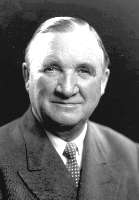|
 |
Emmett Joseph Culligan
 (permission to use photo of Emmett Culligan
courtesy of Josh Sumption, webmaster for the city of Porter,
Minnesota.) (permission to use photo of Emmett Culligan
courtesy of Josh Sumption, webmaster for the city of Porter,
Minnesota.) |
Sparkletts? . . . Britna?
No matter what name you may know in water, remember that
'the Culligan man' was there first - and he was Catholic.
Emmett was born in a small
brick house in Yankton, South Dakota, on March 5, 1893. He grew
up in South Dakota and Sioux City, Iowa. After attending college
for two years he worked and sold land in South Dakota. Emmett
became interested in water conditioning after a stint in World
War I, and spent the following forty-four years developing this
new industry. In 1949 Pope Pius XII conferred upon him Papal
Knighthood in the order of St. Gregory the Great, and in 1962
he was invested a Knight of Malta.
"Water is so little known,
especially by professional people who should be aware of the
many ways it can benefit mankind, especially biochemically. I
consider it a duty that I put between a pair of book covers the
many important observations that I have made during a very active
lifetime." In Culligan's opinion, it is important for "old-timers"
in any industry to write and publish their impressions, hunches
and "know-how," so they can be used by those who follow
them - even though some ideas may not be accepted as facts. For
his field, Emmett chose to write as a non-professional so
he could get around the caution of the professional who must
fear the criticism of colleagues. Emmett wrote down unproven
ideas he considered facts because he personally believed that
they are the truth, but for which there were no answers. He simply
asked that smarter men provide the answers. He considered himself
a "lamp-lighter" and hoped that his work would mark
the beginnning of the age of 'aquaphiles.'
The Culligan Estate wrapped
around Porter, Minnesota, and extended for one half mile in all
directions. It was also one of the first houses to be fully wired
electrically with switches and fuses. The estate included numerous
homes, Culligan Manor being the main house, and two servant houses
to the northwest of the mansion. When Culligan left Porter, his
estate was among the largest in Western Minnesota. Culligan manor
was sold many times and was considered among one of the most
luxurious homes in the state.
Knowing full well his educational
and personal time limits, Emmett hired Fr. John M. Scott, S.J.,
A.M., Ph.L., S.T.L., M.S. to write two more books on his favorite
subject; water and the Catholic Faith. Fr. Scott was well qualified
for the task, having already won several accolades and, in 1959,
was chosen as one of the two outstanding science teachers in
Wisconsin by the Wisconsin Society of Professional Engineers.
Culligan could not state more
emphatically that water should not only be free of germs, but
free also of bad taste - water should be soft and good tasting
so we are encouraged to drink sufficient amounts to maintain
good health. He was convinced that drinking plenty of good, clean
water would prevent all disease and promote a long life.
One of his many examples included acne. According to Culligan,
"it is unnatural for a child to have acne at any age . .
. it is a city ailment. To quit drinking water, or to drink less
than required, is practically the same as to quit breathing air,
or to breathe only a half portion." Culligan even went so
far as to go on a 7,000 mile tour to investigate, visiting high
schools in many different cities to chart adolescent acne against
conditions found in public water supplies. "Where I found
much acne among high school children, the public water supply
either tasted of chlorine, or it contained more than average
hardness." At the same time, traveling through the states
of Washington and Oregon, Culligan found "scarcely any adolescent
acne."
"Why fool ourselves? Why
believe that water is pure and safe when only the germs have
been killed? We are only partially benefited in killing germs
if the water, in doing so, is made less drinkable . . . Chlorine
in water is reported to be harmless, but what is meant is that
it is non-toxic. But it is harmful if the taste of it causes
water starvation." "Insufficient water intake causes
incomplete elimination, with resulting wastes of the body accumulating
to escape in some other way than by natural means. Water is required
for a great many purposes in the body, one of hte important ones
being to eliminate waste products in the intestines and in the
kidneys which result from the combustion of foods. If sufficient
water is provided, these waste products accumulate and seek an
outlet. When this outlet is the pores of the skin, that is acne."
Culligan announced his retirement
in 1965. He retired to San Bernardino, California, and died in
1970.
"I was born a Roman
Catholic. All my ancestors for 1,400 years have been Catholics.
Not one of my forefathers gave up his Catholic faith. I believe
nothing matters other than saving my own soul; and nothing is
more important than helping others save their souls."
Bibliography:
Emmett Culligan on Water (1965)
The Last World War and the End of Time (1950, 1975 by
TAN Books and Publishers, Inc.)
books written under his direction
by Fr. John M. Scott, S.J.:
Rain, Mans' Greatest Gift - the Story of Water (1967)
Our Romance with the Sun and Rain (1968)
Biographical information:
Emmett Culligan on Water and the Porter, Minn. web site. Compiled
by Sarah Gildea.
|
 |